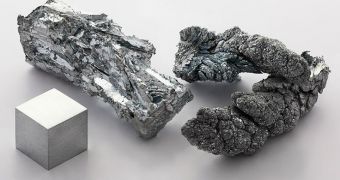Vitamin C and echinacea are two of the substances most widely referred to when people talk about drugs against the common cold. The two are not effective in any way, as demonstrated in studies, and now experts turned their attention to the third chemical on the list, namely zinc.
Over the past few decades, a large number of studies has been conducted on the effects that the element might have on the human body, and on the cold virus. Results obtained over the the years have varied widely, and these variations could themselves be attributed to the value of the research.
Recently, experts with the Cochrane Collaboration did a review of the literature available on zinc, but took into account only 15 studies. All of them were deemed as good-quality, and were selected regardless of what their conclusions were.
The main conclusion of the study is that taking zinc can reduce the time span of the average cold by about a day. Taking the chemicals also reduces the intensity and severity of the symptoms.
But the latter correlation only holds true when the chemical begins being administered no later than 24 hours after the onset of the infection. Among themselves, the 15 studies covered 1,360 healthy people.
It is possible that zinc does have some anti-inflammatory and antioxidant effects, the Collaboration writes in its paper, which was published earlier this year. At the same time, it stops the influenza virus affixing itself to the nasal membranes as easy as it's accustomed to.
On the other hand, the most common side-effects of taking zinc are nausea and an unpleasant taste in the mouth. What the Collaboration could not determine was whether the results the studies found were affected by the participants themselves or not.
In other words, the results of the review are inconclusive themselves, researchers say. Consuming zinc for this purpose is therefore “advised with caution.” But the Collaboration's rather gray outlook on this chemical is not echoed by leading zinc researcher Dr. Ananda Prasad.
The expert, who holds an appointment with the Wayne State University School of Medicine in Detroit, says that the element “is controversial because people have used all kinds of preparations and doses and often did not take lozenges within 24 hours of the first symptoms.”
“If zinc is used properly, and you take lozenges that release it effectively – zinc acetate, though gluconate may also be okay – you can cut the duration of a cold by some 50 percent and the severity very significantly as well,” she adds.
The expert concludes by warning that some of the chemicals which are generally added to zinc products, such as for example vitamin C, citric acid and others, may in fact inactivate the product,
via University of California in Berkeley Wellness Center

 14 DAY TRIAL //
14 DAY TRIAL //